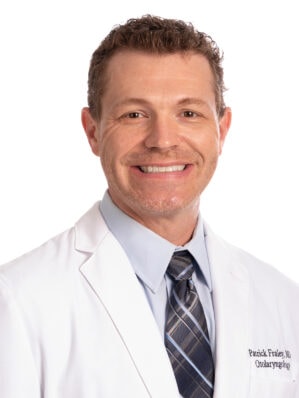
Patrick Fraley, M.D., a board-certified otolaryngologist at the University of Arkansas for Medical Sciences (UAMS), recently became the only physician in Arkansas to be recognized as an Inspire Physician of Excellence.
Inspire is a small implantable device that serves as an alternative for people with moderate to severe obstructive sleep apnea who cannot find relief with a continuous positive airway pressure (CPAP) machine. It is the only FDA-approved obstructive sleep apnea treatment that works inside the body to treat the root cause of sleep apnea.
CPAP machines use a hose connected to a mask or a nosepiece to deliver constant and steady air pressure, keeping users’ breathing airways open while they sleep. However, some patients find the CPAP apparatus too bulky and uncomfortable, and others complain of skin irritation, sores, congestion, headaches, runny nose, dry mouth, nosebleeds or infections.
Unlike CPAP, Inspire works without any attached apparatus. It’s a small pacemaker-like device that is implanted in the upper chest through two small hidden incisions — one in the chest and one under the jaw — during an outpatient procedure lasting about two hours.
It is then activated by a hand-held remote control by the patient after getting into bed. As the patient falls asleep, the Inspire device uses a gentle pulse to move the tongue out of the way, keeping the airway open and allowing normal breathing.
In 2019, Dr. Fraley became the first surgeon in Arkansas to use Inspire. Since then, he has performed more than 115 of the procedures, making him the most prolific user of the technology in Arkansas and earning him an Inspire Physician of Excellence designation — the only one in Arkansas. The designation signifies his expertise, his level of experience with patients, and his positive clinical outcomes. Dr. Fraley is among only 50 surgeons nationwide to receive the designation.
Dr. Fraley performs the minimally invasive surgery at UAMS and at Baptist Health in Conway, the city where he and otolaryngologist Jeffrey Kirsch, M.D., operate the UAMS Health Ear, Nose & Throat (ENT) Clinic. It is one of the state’s few ear, nose and throat clinics that specialize in sleep issues, in addition to other otolaryngology procedures.
Dr. Fraley said Inspire is an alternative to CPAP but isn’t meant to replace CPAP, which is considered the standard of care and the best option for most patients. He said patients must try CPAP first before they can qualify for Inspire. To qualify for an Inspire implantation, patients must undergo a drug-induced sleep endoscopy to determine where their obstruction is coming from. Patients also must have a BMI of under 32 in order for the procedure to be covered by most insurance companies although some insurance companies recently started covering the procedure for people with BMIs of up to 35 or 40.
The Inspire device has a success rate of 70% to 80% and is the generally most effective surgical treatment for sleep apnea. Drs. Fraley and Kirsch continue to provide other alternatives to CPAP for patients who don’t qualify for Inspire or when more appropriate, but Dr. Fraley said these can be painful and require a longer recovery time than the minimally invasive implantation of the Inspire device. They include Uvulopalatopharyngoplasty (UPPP), a surgery to remove extra tissue in the throat; hyoid suspension surgery, which repositions the hyoid bone to improve the stability of the airway; and posterior partial glossectomy, the surgical removal of part of the tongue.
Dr. Fraley has been pleased with the success he has seen with the Inspire device and is now training otolaryngology residents at UAMS to implant it.
